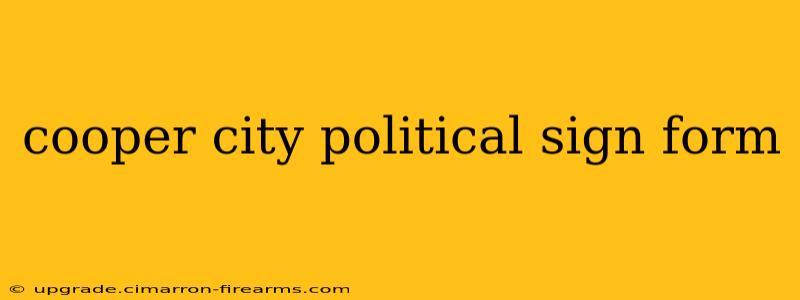Cooper City, like many municipalities, has regulations governing the placement of political signs. Understanding these rules is crucial for candidates, campaign managers, and residents alike to ensure compliance and avoid potential penalties. This guide provides a comprehensive overview of Cooper City's political sign ordinances, offering clarity and practical advice for a smooth and legal campaign season.
Key Aspects of Cooper City's Political Sign Ordinance
While specific details might vary slightly depending on updates to the local ordinances, the core principles generally include:
Sign Size and Placement Restrictions:
- Maximum Size: Cooper City likely restricts the maximum size of political signs. This often includes limitations on both height and width. Consult the official city code or contact the city clerk's office for precise measurements.
- Setback Requirements: Signs are typically prohibited within a certain distance from the street, sidewalks, intersections, and property lines. Understanding these setback requirements is essential to avoid placement violations.
- Number of Signs Per Property: Regulations may limit the number of political signs allowed on a single property, especially along highly visible roadways or in residential areas.
- Prohibited Locations: Certain areas, such as parks, public buildings, and utility poles, are generally off-limits for political sign placement.
Permitting and Registration:
- Permit Requirements: Some cities require permits for the placement of political signs, particularly large or temporary displays. Check with Cooper City's code enforcement or elections department to confirm if a permit is needed.
- Sign Registration: While not always mandatory, registering your signs with the city can help streamline the process and minimize potential issues during removal.
Sign Materials and Construction:
- Durability and Safety: Regulations may specify requirements for sign materials and construction, ensuring they're durable enough to withstand weather conditions and don't pose safety hazards.
- Lighting Restrictions: The use of lighting on political signs might be restricted or prohibited altogether, particularly at night.
Removal of Signs:
- Post-Election Removal: Most cities have regulations regarding the timely removal of political signs after an election. Failure to remove signs within a specified timeframe could result in fines or penalties.
- Responsibility for Removal: It's crucial to understand who is responsible for the removal of signs – the candidate, campaign manager, or property owner.
Where to Find Official Information:
The most accurate and up-to-date information regarding Cooper City's political sign regulations can be found through these resources:
- Cooper City's Official Website: The city website should have a section dedicated to municipal codes, ordinances, or a frequently asked questions (FAQ) page addressing political signs.
- Cooper City Clerk's Office: Contacting the city clerk's office directly is a reliable way to obtain the latest information and clarification on any ambiguous points.
- Cooper City Code Enforcement Department: This department is responsible for enforcing city ordinances, including those pertaining to sign placement.
Tips for Compliance:
- Early Planning: Plan sign placement carefully to ensure compliance with all regulations.
- Consult the Official Documents: Always refer to the official city code for the most accurate information.
- Maintain Records: Keep records of sign locations and permits, if required.
- Respect Private Property: Obtain permission before placing signs on private property.
- Prompt Removal: Remove signs promptly after the election to avoid penalties.
By carefully following these guidelines and referencing the official Cooper City regulations, candidates and residents can ensure their political sign displays are both effective and compliant with local laws. Remember, proactive planning and adherence to regulations contribute to a fair and orderly election process.

